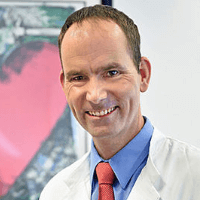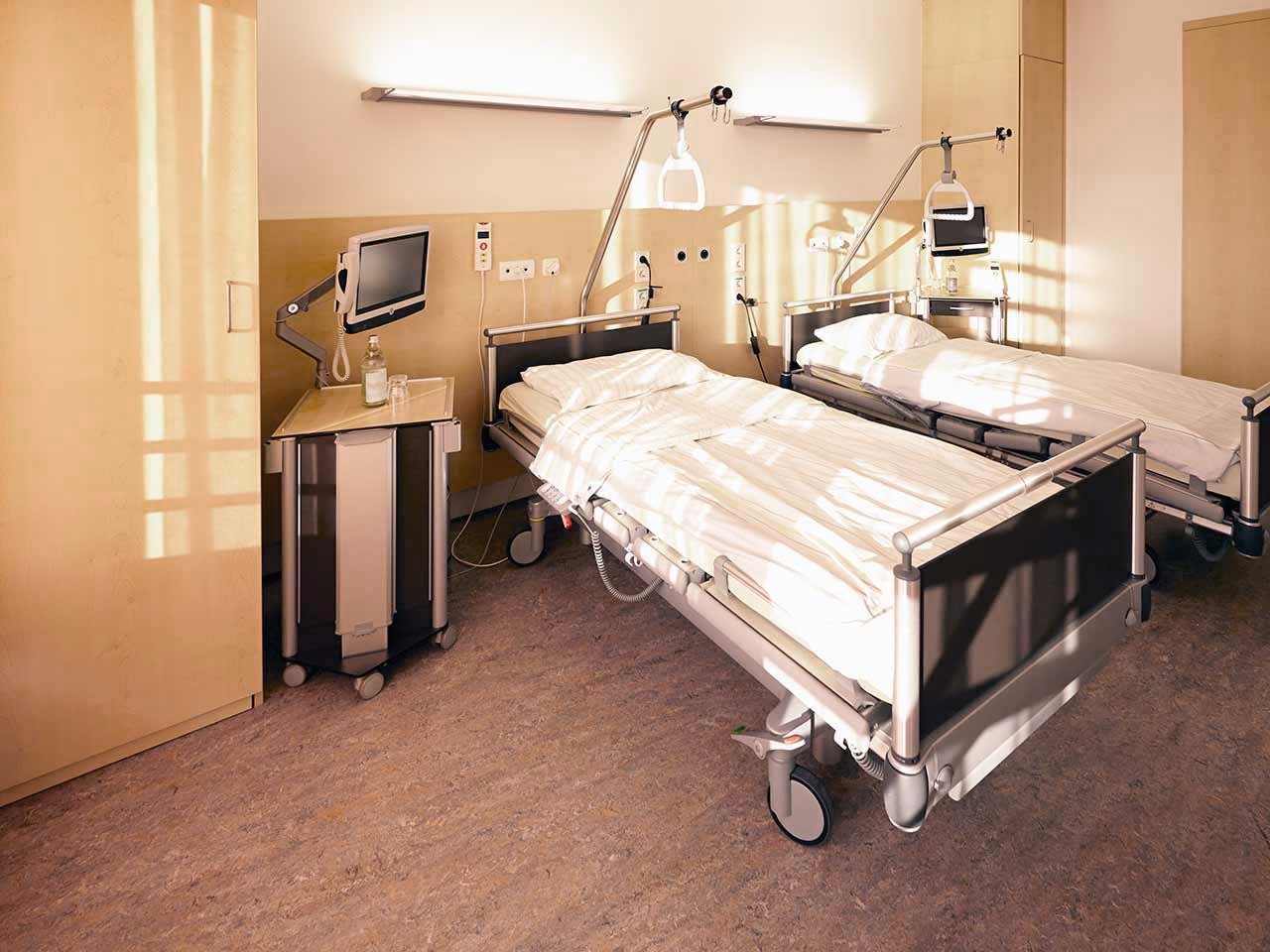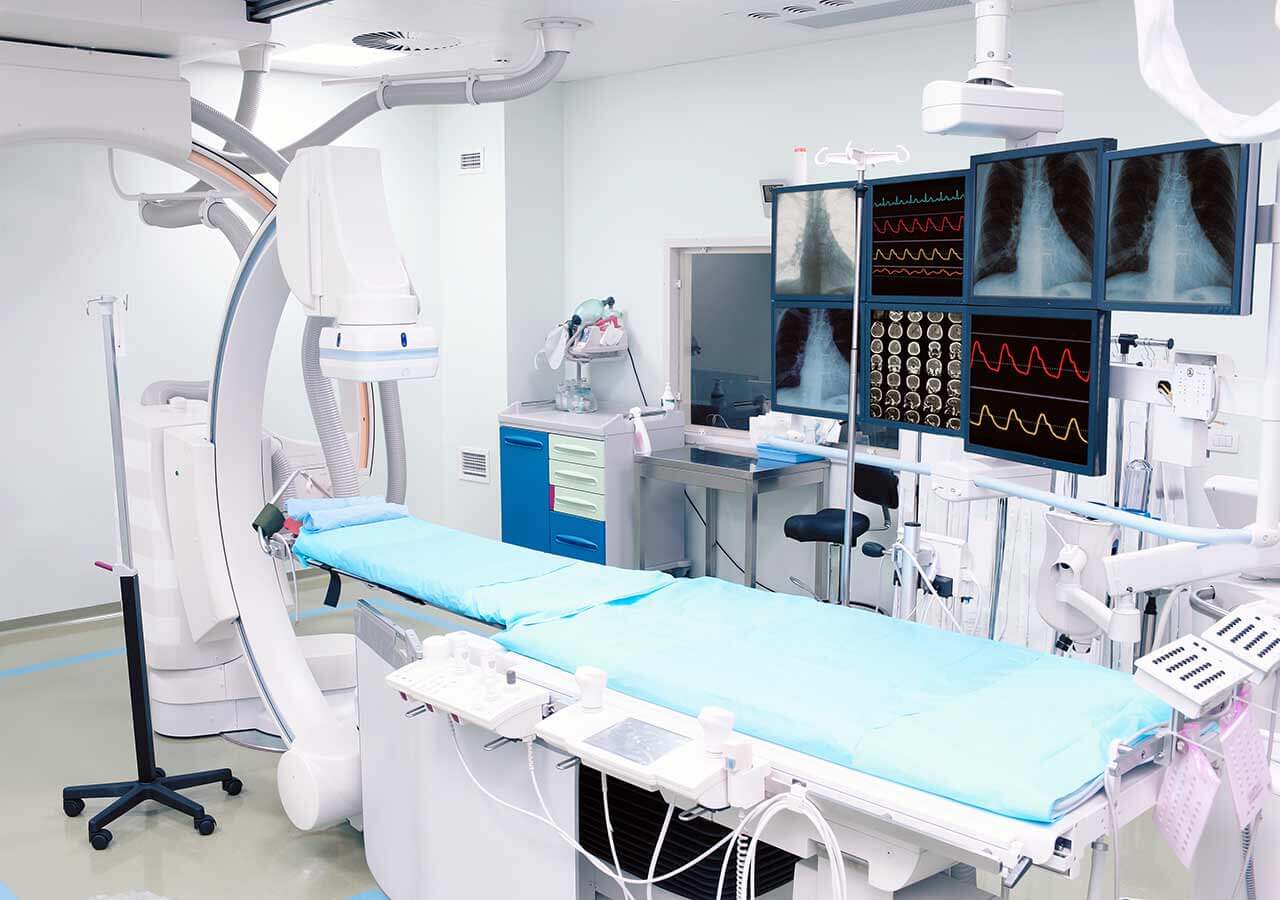
The program includes:
- Initial presentation in the clinic
- clinical history taking
- physical examination
- cardiological examination
- laboratory tests:
- complete blood count
- biochemical analysis of blood
- TSH-basal
- inflammation indicators
- indicators blood coagulation
- measurement of arterial blood pressure
- electrocardiogram
- Holter monitoring (24h)
- echocardiography
- transesophageal echocardiography
- preoperative care
- cardiac catheterization
- surgical reconstruction
- symptomatic treatment
- control examinations
- the cost of essential medicines and materials
- nursing services
- full hospital accommodation
- explanation of future recommendations
Required documents
- Medical records
- Echocardiography (if available)
Service
You may also book:
 BookingHealth Price from:
BookingHealth Price from:
About the department
According to the Focus magazine, the Department of Cardiothoracic Surgery at the University Hospital Jena ranks among the top medical facilities of this kind in Germany!
The department offers the full range of surgical treatment of diseases of the cardiovascular system and thoracic organs in adults. Of particular interest is sparing minimally invasive surgery, particularly, heart valve interventions and coronary artery bypass grafting. Such interventions are carried out using the innovative da Vinci surgical system. The video-assisted thoracic surgical methods are widely used in the surgical treatment of thoracic diseases as well. The department is headed by Prof. Dr. med. Torsten Doenst.
All the department's specialists have excellent qualifications and vast clinical experience, which in combination with the cutting-edge technologies allows doctors to achieve the outstanding treatment results. The surgeons perform many operations on heart valves without thorax resection (for example, without sternotomy), whereas bypass grafting is mostly performed in the same way. The minimally invasive tricuspid valve surgery is the new focus, in the development of which the department's specialists take an active part. The innovative methods in this field give a new hope to the patients who were previously considered inoperable. In addition, the department specializes in complex surgical interventions, which, for example, include complex operations on several valves, as well as the reconstruction of the inner lining of the heart in severe endocarditis. A completely new opportunity is the performance of bypass grafting using mini-thoracotomy.
In the field of thoracic surgery, the surgical treatment mainly involves the use of sparing video-assisted thoracic surgical techniques. Recently, the service range of the department has expanded due to the use of a surgical robot. Nowadays, video-assisted thoracoscopic surgery (VATS) can also be performed using the da Vinci surgical system in the RATS-lobectomy format (robot-assisted).
The service range of the department includes:
- Heart surgery
- Minimally invasive heart valve surgery
- Surgery of the coronary vessels without using a heart-lung machine
- Сoronary artery bypass surgery on a beating heart
- Minimally invasive direct coronary artery bypass surgery
- Treatment of heart failure
- Surgical treatment of the thoracic aorta
- Combined interventions
- Entire range of coronary vascular surgery
- Heart and lung transplantation, as well as combined transplantations (for example, in combination with the liver or kidneys)
- Surgical treatment of arrhythmias (pacemaker implantation, arrhythmogenic focus ablation)
- Surgical treatment of heart tumors
- Surgery for congenital heart defects in adults
- Special surgical techniques
- Reconstructive aortic and mitral valve surgery
- Hybrid operating room with the possibility of carrying out transcatheter aortic valve implantation (in collaboration with the Department of Cardiology)
- Artificial heart implantation
- Thoracic surgery
- Lung cancer treatment
- Removal of lung metastases
- Surgery for mediastinal tumors
- Surgery for thoracic wall tumors
- Treatment of pleural diseases
- Surgery to correct thoracic wall deformities
- Surgical lung volume reduction (for example, in cystic fibrosis)
- Lung transplantation
- Special surgical techniques
- Laser surgery (Nd:YAG)
- Minimally invasive thoracic surgery
- Sparing lung surgery
- Other therapeutic options
Curriculum vitae
Prof. Dr. med. Torsten Doenst studied Human Medicine at the University of Göttingen and at the University of Texas at Houston (1988-1995). The Doctor also completed his research internship at the German Research Foundation, after which he became the Head of the Group of Young Specialists within the Emmy Noether Programme of the German Research Foundation in Freiburg. Dr. Doenst also underwent clinical training for the title of a Medical Specialist in Cardiac Surgery at the University Hospital Freiburg. In 1996, he defended his doctoral thesis. In 2004, Dr. Doenst had habilitation in Cardiac Surgery. After the clinically oriented one-year internship abroad at the Toronto General Hospital in Canada in 2004, he took up the position of a Senior Physician in the Department of Cardiac Surgery at the University Hospital Freiburg. In 2005 he had board certification in Cardiac Surgical Intensive Care. In autumn 2006, Dr. Doenst took up a position at the Heart Center Leipzig, where he initially worked as a Senior Physician and then as a Leading Senior Physician (2010). Here he became one of the first in Germany and the only Cardiac Surgeon who was awarded the Honorary Heisenberg Professorship, which is awarded only to the eminent scientists by the German Research Foundation.
Currently, Prof. Doenst holds the position of the Head of the Department of Cardiothoracic Surgery at the University Hospital Jena. The main clinical interests of Dr. Doenst include minimally invasive heart valve surgery, as well as surgical treatment of heart failure, including the use of mechanical cardiac support systems and heart-lung complex transplantation. He also continues research activities in his research group of more than 10 people. The focus is on the study of energy metabolism dysregulation of the heart muscle as the pathogenetic basis of heart failure.
Memberships in Professional Societies
- American Association for Thoracic Surgery (AATS).
- American Heart Association:
- Council Member on Basic Cardiovascular Sciences.
- Board Member on Cardiac Surgery and Anesthesia.
- Fellow of the American Heart Association (FAHA).
- American College of Cardiology.
- American Physiological Society.
- German Society for Thoracic and Cardiovascular Surgery.
- German Society of Cardiology-Cardiovascular Research.
- European Society of Cardiology.
- European Association for Cardio-Thoracic Surgery.
- International Society for Heart Research.
Review Activities
- 1997 Circulation.
- 2000 Basic Research of Cardiology.
- 2002 Molecular and Cellular Biochemistry.
- 2002 The Annals of Thoracic Surgery.
- 2003 The Journal of Thoracic and Cardiovascular Surgery.
- 2004 Deutsche Forschungsgemeinschaft.
- 2007 Cardiovascular Research.
- 2008 The Journal of the Royal Society Interface.
- 2010 European Heart Journal.
- 2012 Diabetes.
- 2012 Heart.
Honors and Awards
- 1993 Trainee Researcher Award of the American Federation for Clinical Research.
- 1997 Research Prize of the American Federation for Medical Research.
- 1999 Ethicon Poster Award of the German Society for Thoracic and Cardiovascular Surgery.
- 2000 Participation in the Emmy Noether Programme of the German Research Foundation.
- 2002 Eleonora and Fritz Hodeige Prize of the University of Freiburg.
- 2006 Participation in the Heisenberg Programme of the German Research Foundation.
- 2010 Franz J. Köhler Prize.
Photo of the doctor: (c) Universitätsklinikum Jena
About hospital
According to the prestigious Focus magazine, the University Hospital Jena regularly ranks among the top German medical facilities!
The hospital has positioned itself as a multidisciplinary medical facility with a long history of more than 200 years. Since its foundation, the hospital has been constantly developing and modernizing, thanks to which nowadays it offers patients the highest level of treatment in Germany based on the use of innovative technologies and the very latest therapeutic techniques. The hospital consists of 26 specialized departments and 25 research institutes. It treats more than 53,600 inpatients and about 274,000 outpatients every year. The staff of the hospital includes more than 5,600 competent doctors.
The extensive resources of the university hospital, high treatment standards, and the introduction of new research developments provide first-class treatment in Germany meeting the stringent international standards. The hospital has an excellent reputation not only in Germany, but also far beyond its borders, due to which it accepts a large number of foreign patients for the diagnostics and treatment.
Despite the technical progress and the availability of accurate computerized systems, the patient’s physical health and emotional state is the main value of each employee of the hospital, since some diagnoses cause emotional distress in patients. The doctors of the hospital believe that the key to a successful result is a comprehensive and individual approach, so they spend a lot of time talking with patients, listen carefully to all their wishes and support at all stages of the therapeutic process. All this in combination with high-precision diagnostic techniques and the very latest types of therapy forms a solid basis for the achievement of an optimal treatment result.
Photo: (c) depositphotos
Accommodation in hospital
Patients rooms
The patients of the University Hospital Jena live in comfortable single and double rooms made in a modern design. Each patient room is equipped with an ensuite bathroom with shower and toilet. The room has enough space to store personal belongings, as well as a table and chairs for receiving visitors. A bedside table can be converted into a table so that patients can eat right in their bed. Each room has a TV, and there is also access to the Internet. In addition, the hospital offers enhanced-comfort rooms.
Meals and Menus
The patient and his accompanying person have a daily choice of three menus. If for some reason the patient does not eat all the foods, he will be offered an individual menu. Please inform the medical staff about your dietary preferences prior to the treatment.
Further details
Standard rooms include:
Religion
Religious services are available upon request.
Accompanying person
During the inpatient program, an accompanying person may stay with you in a room or at the hotel of your choice.
Hotel
During the outpatient program, you can live at a hotel of your choice. Managers will help you to choose the most suitable options.





